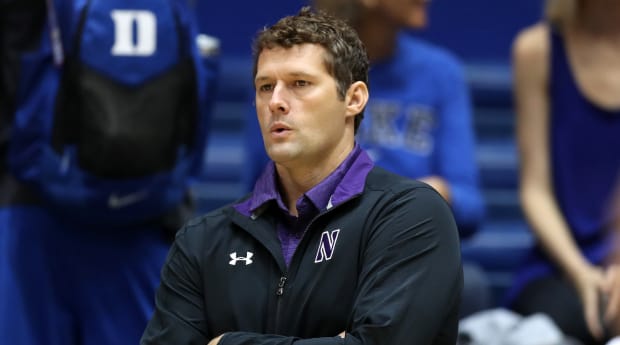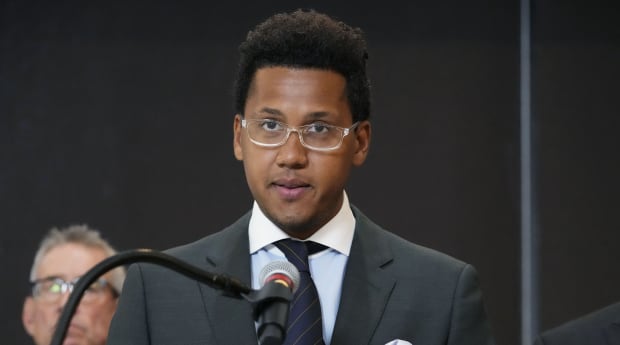Lawyers for former Northwestern athletes announced two benchmark lawsuits against the university on Monday as part of its sprawling hazing scandal: the first by a woman athlete and the first by a player willing to be named. That player was former football player, Lloyd Yates, a Wildcats quarterback and receiver from 2015–17. That brings the total number of suits against the school in recent days to five, with lawyers promising several more. Collectively, the lawyers and former athletes have alleged that Northwestern fostered a culture rife with discrimination, harassment and hazing.
The woman athlete played volleyball for Northwestern and cited a hazing incident that occurred in the spring of 2021. Her suit is the first brought by a non-football player and names as defendants current president Michael Schill, former president Morton Schapiro, the school’s board of trustees, athletic director Derrick Gragg, ACC commissioner Jim Phillips (formerly athletic director at Northwestern) and former head volleyball coach Shane Davis.
The volleyball player’s lawyers, Pat Salvi II and Parker Stinar of Chicago-based Salvi, Schostok & Pritchard, also claimed to know of harassment and hazing issues within the softball program, but have not yet provided evidence backing those claims. The complaint alleges that the volleyball program has had “longstanding issues involving hazing, harassment, bullying, and retaliation,” and that Davis, the coach, not only bullied players but also bragged about doing so at previous coaching stops. Davis did not respond to a request for comment.

Andy Mead/YCJ/Icon Sportswire/Getty Images
The complaint alleges that the unnamed volleyball player was forced to participate in a punishment workout for breaking the team’s COVID-19 policies on March 2, 2021, which resulted in physical injury. The punishment was running sprints and having to dive to the floor when she reached a certain line on the court, as coaches and teammates watched (the volleyball player also denied breaching the team’s COVID protocol). The school’s website announced at the time that the team had matches postponed against Michigan State on March 5th and 6th for “COVID issues” on the Spartans team. The next week, matches on the weekend of the 12th were postponed because of “a pause in Northwestern team activities.”
The complaint also alleges that Northwestern opened a hazing investigation shortly after the incident. While the investigation was ongoing, the suit says, Davis was suspended, but the school ultimately kept him on, despite the investigation finding activity that was “deemed to be hazing.” Davis remains the team’s current coach. The volleyball player says she was not provided a copy of the investigative report. She later medically retired from the program.
“Jane Doe 1’s case is an example of how an enabled culture and an enabled coach had become accustomed to practices of hazing and abuse for years, if not decades,” Salvi said in a statement. “We see in Jane Doe 1’s story how the hazing and abuse causes physical and emotional harm. Her story is sadly not uncommon, and it permeates across sports, men and women, and across campuses.”
The lawsuit brought by Yates, the former football player, was filed by a legal team helmed by civil rights attorney Ben Crump and named just Northwestern University as a defendant. Yates spoke at a press conference last week along with former teammates about the athletic department’s culture.

Nam Y. Huh/AP
The complaint alleges that, as a freshman, Yates was subjected to a “required” viewing of a video in which a man recalls that he had a sexual encounter with the fictional animated character Shrek in his bedroom as a child, as an introduction to the team’s “Shrek Squad.” According to the complaint, the squad, a group of upperclassmen wearing masks would torment teammates, including by subjecting them to “running,” a practice used by players to punish team members (typically younger), by forcibly dry humping them. The complaint alleges that Yates was “ran” by 12-15 upperclassmen during his first summer training camp at the Wildcats’ off-campus site in Kenosha.
The complaint also alleges that Northwestern players were pressured into doing naked pull ups, naked center-quarterback exchanges, and football drills including a one-on-one pass rushing drill performed naked. It also alleges players were made to climb a climbing rope in the locker room while naked and slide down dubbed the ‘naked rope swing.’ Refusal to participate, the suit says, could result in “running.”
The complaint also claims that multiple coaches were ran by players, including a strength and conditioning coach who was “ran” by members of the football team in front of the team and coaching staff. It also alleges an unnamed player, who is not a plaintiff in the lawsuit, was subject to “running” while he was a minor.
In a press conference, Crump did not offer a clear answer when asked if law enforcement would become involved due to the assertion a minor was involved. Crump said his legal team is planning to file over 30 individual lawsuits in the coming weeks and months, in what he’s calling college sports’ “me too” movement.
“I hope three things will come out of this lawsuit,” Yates said in a press conference Monday. “I want justice for all the victims of this horrific hazing, I want closure for myself and hundreds of other Northwestern football players who suffered in silence. Too often many of us have blamed ourselves for things that were beyond our control. Lastly, I want protection for future players. Northwestern failed to protect us. I hope this lawsuit ensures that Northwestern will protect future generations of student athletes.”
Yates also made it clear that he considers the players who committed the alleged hazing to be victims, too.
Head coach Pat Fitzgerald has denied knowledge of any hazing within his program, and unlike three suits filed last week by his former players, he is not currently being sued by Yates. When asked for comment, a school spokesperson provided a near-identical statement to what was provided last week to SI:
“Shortly after learning the results of the independent investigation into hazing on the football team, the University announced a series of steps including the monitoring of the football locker room, anti-hazing training and the establishment of an online reporting tool for complaints,” the statement read. “These steps, while necessary and appropriate, are just the start, and we will be augmenting them in the coming weeks.”
The statement went on to say that the school will engage an outside firm, with input from faculty, staff, and students, to review accountability mechanisms and how the university detects threats to student-athlete welfare. Both reviews will be publicly available, the statement said.
Northwestern president Michael Schill also released a letter to the university community pledging support for athletes.







